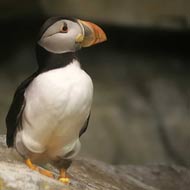
Rats fed on the seabirds' eggs and chicks
A group of islands off the coast of Scotland have been declared officially rat-free following a four-year project to restore them as a nesting haven for seabirds.
A month-long intensive check in February found no sign of rats on the Shiant Islands. These means there has been no recorded sighting for two years - meeting the internationally agreed criteria for rat-free status.
The Shiants Seabird Recovery Project began in 2014 and is a partnership between Scottish Natural Heritage, RSPB Scotland and island owners, the Nicolson family. Over the past four years, the project has centred on making the Shiant Islands a safe place for seabirds to raise their chicks by removing the invasive, non-native black rats that were found there.
In a press release, the RSPB said that the project had been a ‘huge success’ and played an important role in developing future island restoration and biosecurity work in the UK. The charity anticipates that the seabirds, including razorbills, puffins and guillemots, will see improved breeding successes which could eventually support population increases.
Dr Charlie Main, senior project manager for the Shiant Isles Recovery Project said: “This is an absolutely fantastic moment for the Shiant Isles and everyone involved in the project is delighted that they are now officially rat-free. With so many of Scotland’s seabird populations in decline, it’s vital that we do all we can to help them. Making these islands a secure place for them to breed is really important.
“Over the next few years, we’re really looking forward to seeing the full impact of the islands’ restoration flourish with the seabirds enjoying improved breeding successes, and other species beginning to breed there as well. We’ll also continue to work with the local community to ensure this special place remains free of rats. This project has paved the way for more island restorations to take place around Scotland and give our threatened seabirds the best possible chance for the future.”
Located five miles east of the Isle of Lewis, The Shiants is an important seabird breeding habitat. However, there was evidence that the rats were feeding on the seabird’s eggs and chicks.
Together with 15 volunteers, New Zealand-based company Wildlife Management International Limited led the action to eradicate the rats over the winter on 2015/16. To ensure that the islands remain rat-free, visitors are being asked to follow simple biosecurity measures including checking boats and looking out for signs of them when on the island.



 HMRC has invited feedback to its communications regarding the employment status of locum vets and vet nurses.
HMRC has invited feedback to its communications regarding the employment status of locum vets and vet nurses.